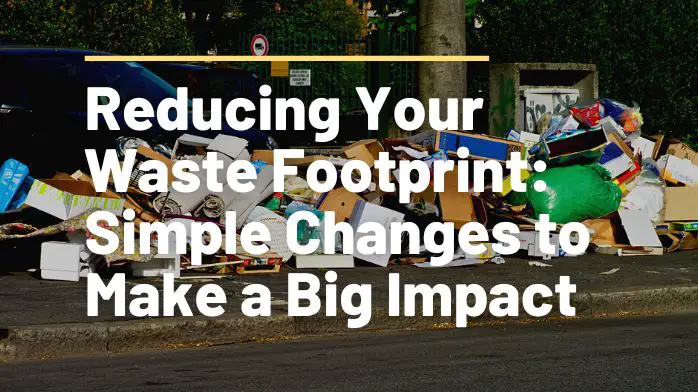Reducing your waste footprint is a great way to help protect the environment. Here are some simple changes you can make to make a big impact:
- Use a reusable water bottle: Single-use plastic water bottles generate a lot of waste. Using a reusable water bottle can reduce waste and save money by buying bottled water.
- Bring your shopping bags: Single-use plastic shopping bags are a major source of waste. You can reduce waste and help the environment by bringing your reusable shopping bags.
- Recycle: Many people throw away recyclable materials, such as paper, cardboard, and plastic. By recycling these materials, you can help conserve resources and reduce the amount of waste going to landfills.
- Compost: Instead of throwing away food waste, you can compost it. Composting breaks down organic materials and turns them into nutrient-rich soil, which can be used in gardens and landscaping.
- Fix things instead of buying new ones: Instead of throwing away broken items and buying new ones, try to fix them. This will save resources and reduce the amount of waste going to landfills.
By making these simple changes, you can help reduce your waste footprint and positively impact the environment.
Reusable Water Bottles
Reusable water bottles are a great way to reduce waste and save money on bottled water. Here are some tips for using a reusable water bottle:
- Choose a high-quality bottle: Look for a water bottle made of durable materials such as stainless steel or BPA-free plastic. These bottles are more likely to last longer and are better for the environment.
- Wash your bottle regularly: To keep your water bottle clean and hygienic, it’s important to wash it regularly. Use warm, soapy water and a bottle brush to scrub the inside and outside of the bottle.
- Don’t freeze or microwave your bottle: Many reusable water bottles are not designed to withstand extreme temperatures. To avoid damaging your bottle, don’t freeze or microwave it.
- Replace your bottle when needed: Even the best water bottles will eventually wear out and need to be replaced. When this happens, recycle your old bottle and replace it with a new one.
Following these tips, you can use your reusable water bottle for years to come and help reduce waste.

Reusable Shopping Bags
Reusable shopping bags are a great way to reduce waste and help the environment. Here are some tips for using reusable shopping bags:
- Keep a few reusable bags in your car: You’ll always have them when shopping.
- Use a bag with a sturdy handle: Look for a sturdy handle that can hold heavy items without breaking.
- Store your bags in a convenient location: Keep your reusable bags in a place where you’ll remember to grab them before you leave the house, such as by the door or in the trunk of your car.
- Wash your bags regularly: To keep them clean and hygienic, wash them with warm, soapy water.
- Use bags of different sizes: Have a variety of bag sizes on hand to accommodate different types of purchases.
Using reusable shopping bags can help reduce waste and protect the environment.
Recycle Your Waste
Recycling is a great way to reduce waste and conserve resources. Here are some tips for recycling your waste:
- Learn what can be recycled in your area: Different communities have different recycling programs, so it’s important to find out what can be recycled in your area. You can usually find this information on your local government’s website or by contacting your waste management company.
- Rinse containers before recycling: It’s important to rinse them before recycling them to remove any food residue. This will help prevent the growth of bacteria and odors, and it will also make it easier to recycle the material.
- Recycle properly: Make sure to recycle items in the correct category. For example, paper should be recycled with paper, and plastic should be recycled with plastic.
- Don’t recycle items that can’t be recycled: Some items, such as plastic bags and Styrofoam, cannot be recycled through most recycling programs. It’s important to properly dispose of these items to avoid contaminating the recycling stream.
Following these tips can recycle your waste properly and help conserve resources.
Compost Food Scraps
Composting is a great way to reduce waste and create nutrient-rich soil for your garden or landscaping. Here are some tips for composting food scraps:
- Choose the right composting method: There are several methods for composting food scraps, including backyard composting, worm composting, and bokashi composting. Select a method that works best for your space and needs.
- Collect food scraps in a compost bin or pail: Keep a compost bin or pail in your kitchen to collect food scraps. Avoid putting meat, dairy products, or oils in your compost bin, as these can attract pests or produce odors.
- Add a mix of “green” and “brown” materials: To create a healthy compost, it’s important to add a mix of “green” materials (such as food scraps and grass clippings) and “brown” materials (such as dried leaves and branches).
- Turn the compost regularly: To help it break down, turn it regularly with a pitchfork or compost aerator. This will help oxygen circulate and speed up the decomposition process.
Composting food scraps can reduce waste and create valuable soil for your garden or landscaping.
Fix Broken Household Items
Fixing broken household items is a great way to reduce waste and save money. Here are some tips for fixing broken household items:
- Research the problem: Before trying to fix something, it’s important to understand what’s wrong with it. Look up the issue online or consult a repair manual to learn more about the problem.
- Gather the necessary tools and materials: Ensure you have the tools and materials needed to fix the item. This might include things like screwdrivers, pliers, or replacement parts.
- Follow instructions carefully: If you’re using a repair manual or online instructions, follow them carefully. This will help ensure that you fix the item correctly and safely.
- Take your time: Don’t rush the repair process. Take your time and be careful to avoid causing further damage to the item.
Following these tips can fix broken household items and reduce waste.
Conclusion
You can make many simple changes to reduce your waste footprint and help the environment. These include using a reusable water bottle, bringing your shopping bags, recycling, composting, and fixing broken items instead of buying new ones. By making these changes, you can help reduce waste and positively impact the environment.

